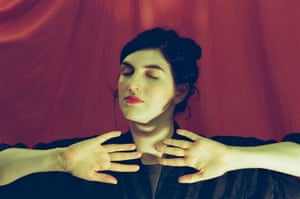Virginia Wing have developed a high tolerance for sexism since forming in 2012. Over doughnuts in a punky Manchester bakery, Alice Merida Richards and Sam Pillay laugh off the time one journalist temporarily shut down when Pillay went to the loo mid-interview. They’re used to the “unspoken mythos that he’s the puppet master and I’m the singer,” says Richards. The troglodytic sound guys aren’t even worth mentioning. “They’ll burn in hell!” Pillay decides.
But the synth-pop duo did reach breaking point on a recent “emotionally draining” tour with Leeds psych band Hookworms. They’re quick to affirm their love for the group and their mutual leftwing politics; the problem was the dissonance between Hookworms’ progressive worldview and their blokey fans. “Good old-fashioned rock music!” Richards imitates. “The good old days of Hawkwind and being openly sexist.”
Richards was the only woman on the tour, which was already grating before they played Hookworms’ hometown show. “A horrendous atmosphere,” she says. “The front row was completely men, and you know when men just become immovable, like, ‘This is my space’? Any time a woman was passing, they’d leer or obstruct her.” In response, they performed the rest of the dates in front of a hot pink projection that read: “END RAPE CULTURE.” Fans cheered for it in Glasgow and London. But in Manchester and Newcastle, the response was hostile. “They instantly felt attacked, like you’re accusing them of rape,” says Richards.
In a statement accompanying the release of Virginia Wing’s superb third album, Richards says the past year – the aftermath of Trump and #MeToo – left her feeling “the weight of my gender so acutely that it has become inescapable”. And so Ecstatic Arrow was envisaged as an escape, a “slightly utopian vision,” she says. She rejected the idea that women’s art is only as valid as their trauma, refusing to dignify that oppressive feeling in her lyrics. “I don’t wanna have to relive painful experiences to be authentic,” she says. “I want to see joy and be optimistic and for that to be enough.”
Ecstatic Arrow sounds like escape, too: spacious, understated pop songs dappled with elegant koto, modular synths and radiant saxophone. It’s as accessibly avant-garde as Peter Gabriel, Laurie Anderson, Malcolm McLaren and Hounds of Love-era Kate Bush: “That late-70s, early 80s cross-section of pop meets conceptual art,” says Richards. They recorded at a friend’s house in Switzerland, prizing routine and domesticity over awaiting the muses. “We got out of the habit of being our own torturers,” says Richards. Maybe the biographical details exert an undue influence, but Ecstatic Arrow genuinely seems to shimmer with alpine calm. For Pillay, the idea behind the sound crystallised when they were driving through the Peak District listening to Brian Eno’s The Big Ship. “Everything felt very clear. It’s so powerful and self-assured, not overly epic. It speaks to everything I want to convey – a quiet strength. I’m not interested in people shouting.”
Ecstatic Arrow is all about a different kind of confidence in one’s own voice. In her cool sprechgesang, Richards subtly indicts how men and women’s voices are received. “I’d like to estimate how many drown in compliments given like a consolation prize,” she wonders on The Second Shift, commenting on the language used to minimise women’s achievements. The album concludes with Seasons Reversed and Richards affirming that “daughters will speak without the need to please … And now that I’m sure, I won’t hesitate or try to find an excuse not to open and walk through the door”.
Pillay had previously been in all-male bands and says that the one thing he had to reassess, being in a band with Richards, is how few women are often in the room: “How women are represented on lineups because music is a dude-fest. Once you see it, you can’t un-see it.” But Richards says there’s more to it than that. “You weren’t necessarily aware that being a female musician, you have an inherent self-doubt,” she says to Pillay. “You’re taught you’re not good enough, not capable. Any bloke with a pair of good jeans, it’s like, ‘You can be a genius, the next bedroom Brian Wilson, because you just have it in you.’ Whereas a woman, you’re beating yourself up constantly because you’re like, ‘I have to prove myself.’ You didn’t think that’s something I would have.”

Pillay admits that he could be “so overbearing” when Virginia Wing started, a hangover from how his old band Let’s Wrestle had functioned: “Fortunately, we got over that fairly quickly, because it just wasn’t an enjoyable way to exist.” They screamed at each other while making Forward Constant Motion, but got along on the new album. “It’s the closest we’ve ever been to – I’m sorry, I’m gonna say this – who we are,” Pillay says sheepishly, wary of reinforcing the tired indie-boy “last gang in town” mentality.
The artwork depicts a flag suspended between the pair’s hands in front of the Alps. “I saw it as staking your claim to a new world,” says Richards. “It’s your flag, it represents your ideals and your world vision.” They’re both hopeful that the toxic values they experienced on the Hookworms tour – and what Richards calls the “crap indie boy edgelords” who “think they’re Mark E Smith, some anti-mainstream subversive because they allege to be Nazis” (they mean Fat White Family) – are on their way out.
“This is fucking arrogant, I’m sorry,” says Pillay, gaining steam again, “but the permanence of everything we were around in Switzerland, this nature that’s been there for years, it makes me feel like nothing human is permanent. Everything that’s negative and destructive and upsetting to people that I care about, within music – it’s all gonna go. It’s going already. We will remain in the nicest possible way.” He laughs. “Maybe not in a band! But positivity will come through.”
• Ecstatic Arrow is out now on Fire Records.